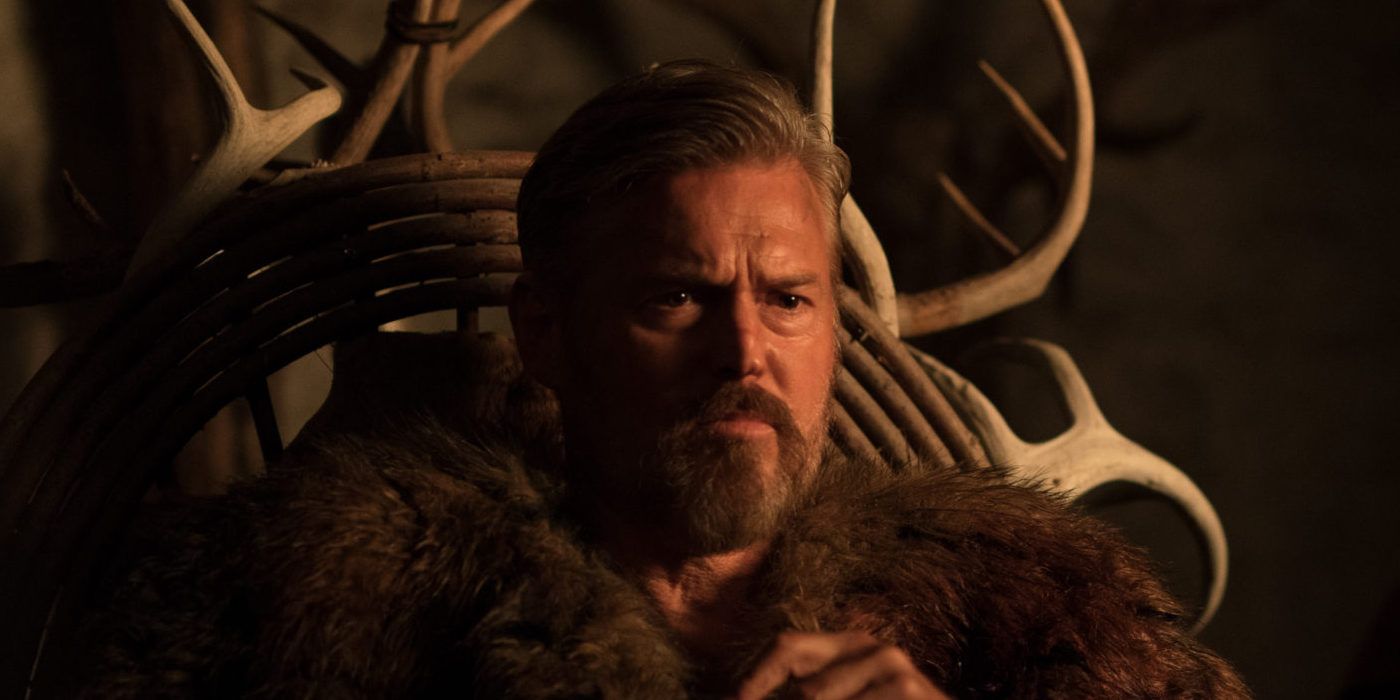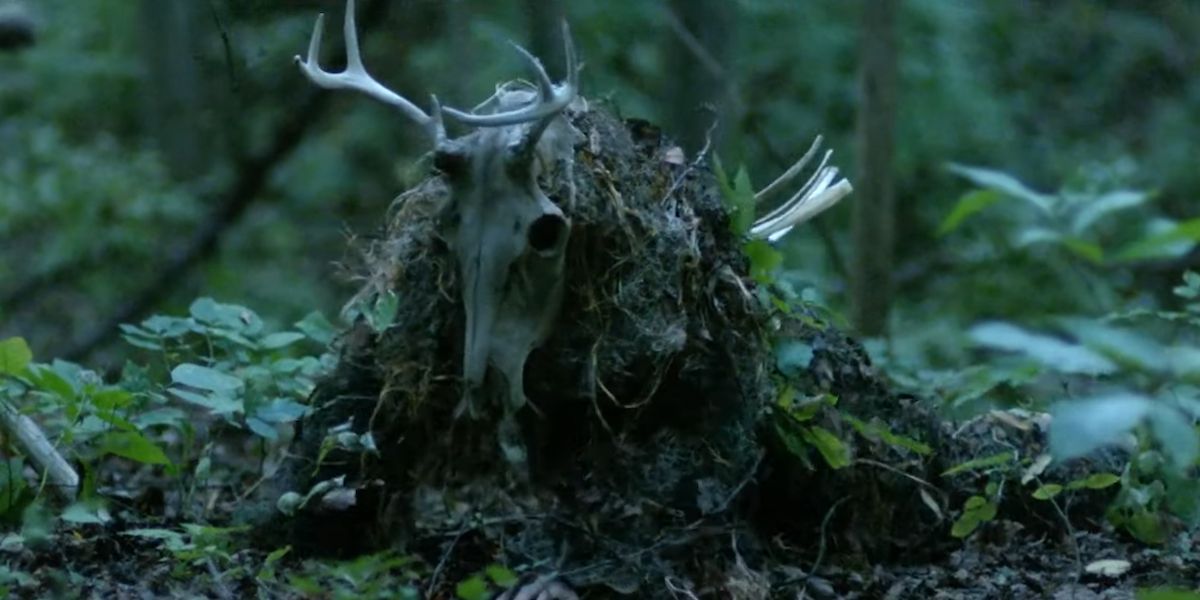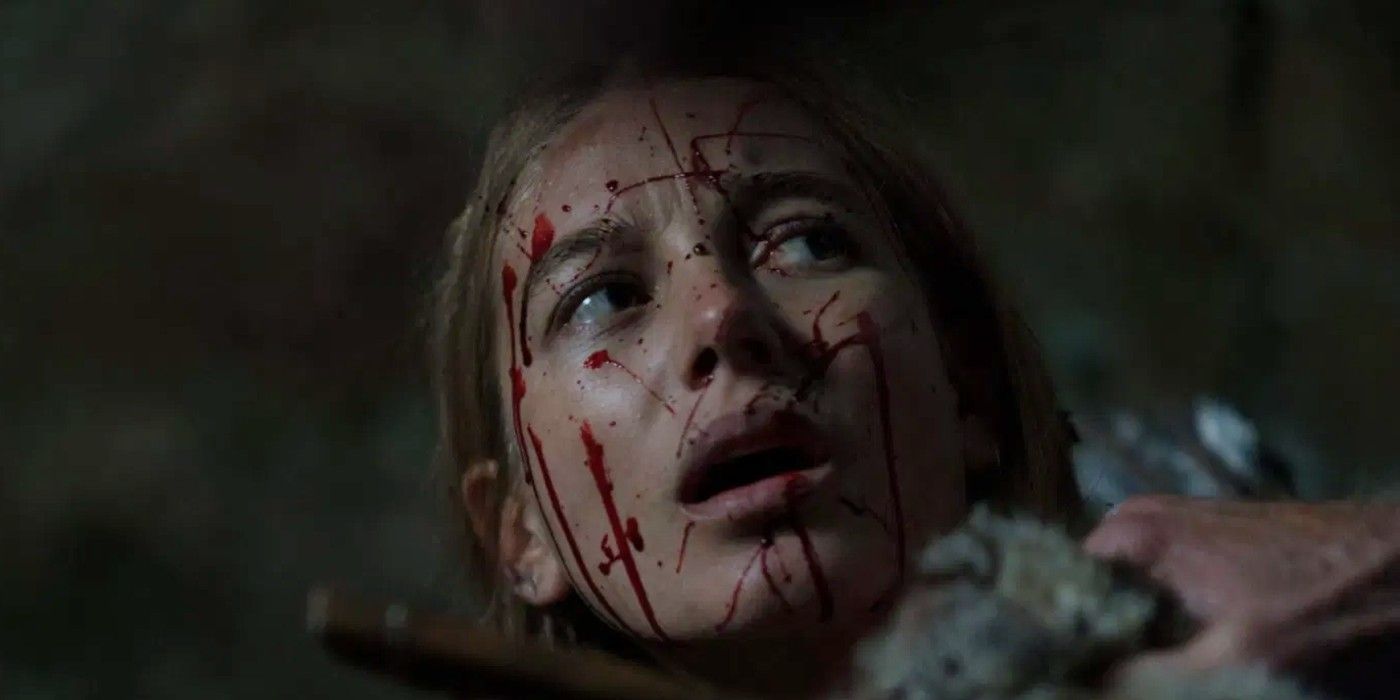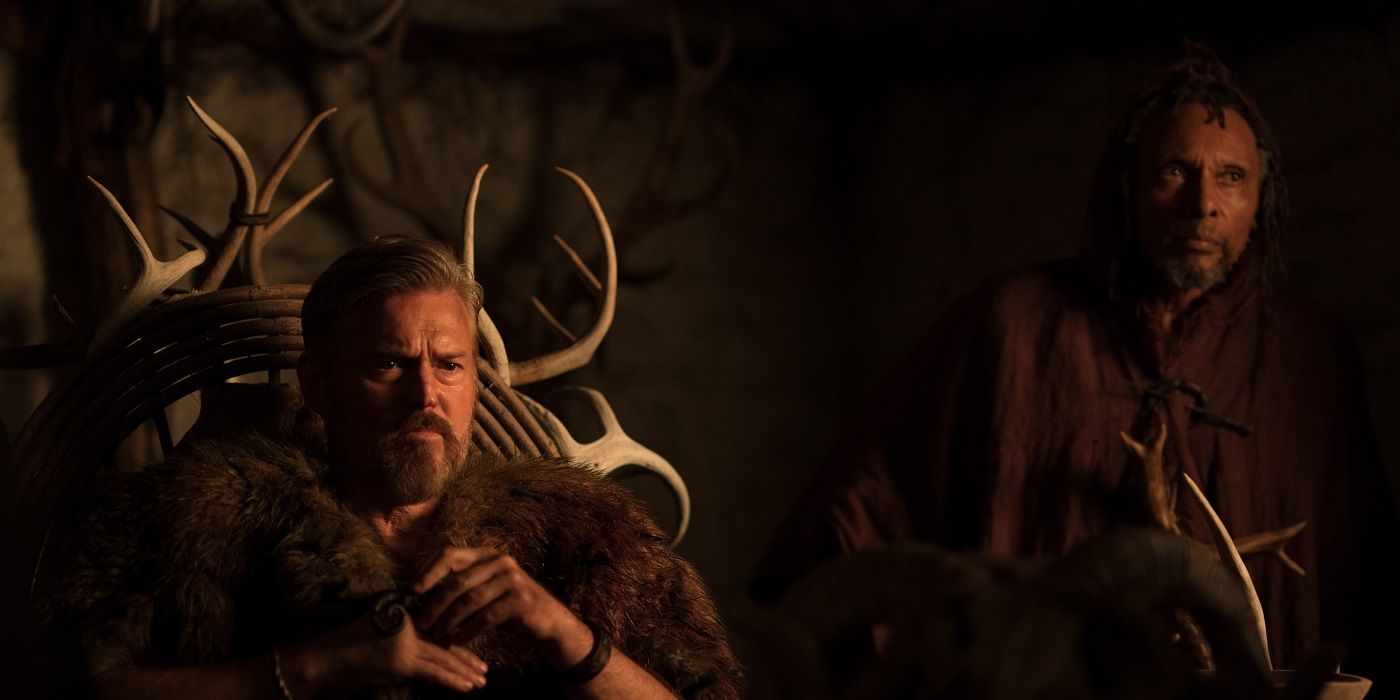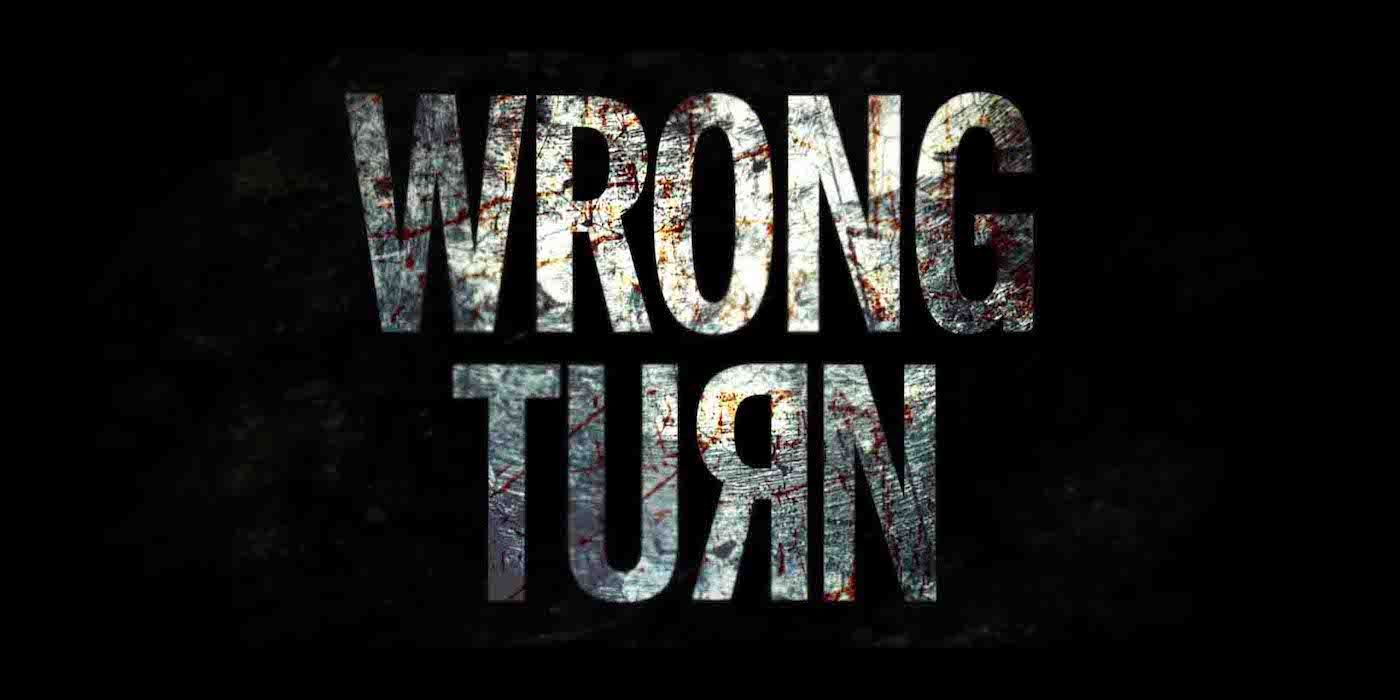Nearly twenty years after the original Wrong Turn first introduced audiences to the mutant cannibals of West Virginia, and after six films set (loosely) within that original continuity, the franchise is getting a unique reboot. Original writer Alan McElroy is back, but the new Wrong Turn eschews the established lore of man-eating inbred monster-men with a more grounded threat: The Foundation, a clan of isolationist survivalists who follow their own set of American-adjacent ideals.
Bill Sage co-stars as John Venable, the leader of The Foundation, and his scenes are some of the most intense in the film. The barrel-chested actor strikes an imposing presence, and his booming voice is commanding, but just short of unbelievably over-the-top. Venable feels like a genuine leader, and he's a good at what he does, ordering his citizens and carrying out punishments that are cruel and barbaric, but entirely within his community's code of honor. The new Wrong Turn is a more gritty and grounded take on the series, but benefits greatly from this newfound realism, and its themes of tribalism are easily applicable to the increasingly divided America of the 21st century.
While promoting the release of Wrong Turn, Bill Sage spoke to Screen Rant about his work on the film and his career as a Hollywood actor. He talks about Wrong Turn and its status as a reflection, intentional or not, on modern day America, and how he was drawn into the world of The Foundation. He explains his trajectory in the acting business and how he never set out to become a celebrity. Finally, he discusses the ongoing Coronavirus pandemic and its effect on big and small Hollywood productions.
Wrong Turn is out now in theaters, Digital, and VOD.
You're a born-and-raised New York guy, right?
No, I'm from Oakland!
Oh, okay.
My dad was in the Navy, so we moved around a bit. But as an actor, I've really been a New York... I've lived in L.A. for periods of time based on what I was working on, but I'm a New York guy.
New York is fascinating because you don't have to go that far upstate before you're in mountain people territory, and a lot of city folk really aren't aware of that.
That's right. Appalachia goes up here, too!
Yeah, I'm a city boy myself, but a lot of city people tend to thing "upstate" means, like, 125th street. They don't realize the whole world that's up there!
Yeah, it's a whole different deal. I like it. I really love it. I really started to like it when we shot We Are What We Are up here.
Do you consider yourself more of a mountain man than a city boy?
Yeah, at this point now? Yes. Especially during this Covid situation. I'm definitely, yeah.
Cool. Let's jump into the movie. What was your knowledge of the series up to this point, and when did you realize you weren't playing a mutant cannibal person?
Just reading the script. It had been a while, since, like, 2004, when I saw the first one. I think that's the only one I saw. I liked it, but I like horror. But just reading this script, I wasn't interested in doing a remake of anything, so I didn't know... But then I got to a certain point in the script and I realized it was very different. Same writer, but a very different story. This is how you go about something like this. He clearly and purposefully made it different, and then Mike... Some of the things that you see there are very purposefully done. The departures from the original. These are real people. I think, in a lot of ways, it makes it more scary, especially in today's climate. The film feels...
There's this Hollywood thing where the hero is always more handsome than the bad guys, and I mean... Just look at you, Bill Sage, Hollywood hunk! That formula doesn't apply here.
(Laughs) I don't know about that! That's nice of you to say. But those are some good looking young people!
True.
But I think, what you're saying is that, you know, you're expecting something different.
Or the same, from the seventh in a series.
And the kids are, at first, kind of obnoxious! And then, when you meet John Venable, he is definitely not someone to be trifled with, and he has a really strong point of view, and you get the right away. He raises some interesting questions. "Why is your world? You want to help us? Why do we need your help?" I think the film does a good job with that.
It's delightful in the way it subverts our expectations that have been built in from the six previous movies. It'd be easy to just retread that, and boom, "Wrong Turn 7: Still Turning," but at every turn, this one is new and different. And the movie gets to say a lot about America and how we're tribal and always at each other's necks. This country is huge, or yuge, as some might say...
Exactly.
It's hard to reconcile the differences between people who are, at the end of the day, our countrymen.
Today, you could have a very brief conversation with somebody and kind of know what their point of view is, or at least what you would assume it is. And this movie asks us to maybe not come to conclusions so quickly, not to assume that you're right. And also, let's look at the facts. We've been through a hellish four years, and now a pandemic that should not be as trying as it is. The country doesn't know what the facts are, even if it's right in front of you. I don't think the film has anything to do with that, and I don't think that was the intention, but I think it does work that way. The Foundation has their reasons. They're sound reasons.
They're still villains, and your character is still a villain, but they definitely have a point, and that's what makes them the most dangerous.
Absolutely. That's what makes anything really dangerous, right?
When they have a point, totally. You mentioned We Are What We Are... I have to confess I've never seen it, but Nick Damici and Jim Mickle are a really great team.
I've worked with those guys a bit. you know, on Hap and Leonard, that they did.
And I know Nick was big into yoga back in the day...
Really? I know he was a big martial arts teacher, too.
That kind of makes me want to ask, for you, did you always see yourself growing up to become an actor or a movie star? Was there a different trajectory you had in mind?
Acting came a little later for me. I thought I would be an engineer. I was good at math and that kind of thing. But I also loved art, through my mom. My father was in the Navy, and my mother was a schoolteacher and an artist. I hate to say it, but I did kind of just fall into acting. I ended up auditioning for an acting conservatory, and then went. I just worked steadily over the years, and I really love it. Sometimes it's a grind, but I don't know, I've been fortunate enough to consistently get work. I'm not really a celebrity-minded individual, so that's never been anything that's ever plagued me. That's fortunate, too. I find myself really enjoying what I'm doing more and more. I mean, I loved making this film. I'm noticing that I'm enjoying work more than I ever have, and I've been doing it for a while.
That's kind of the trick, right? If you were a celebrity-minded individual, then you'd be playing Bill Sage in everything.
That's right. I think, because I didn't have that trajectory, it just wasn't anything that I... I don't find celebrities interesting. They don't interest me at all. I have nothing against them, but I'm sort of bored by that. I think it's allowed me to keep reinvesting and enjoying each new project I get on. I have no control over what it's going to be. Even during Covid, I have loved acting. I've done Zoom plays and that kind of stuff. And I've been back on sets since. It's doable. It's just another thing. We just have to maintain the social distance on a set, and mask up between takes, you know? It's just like anything else. Just another piece of blocking.
I was wondering about that, if some actors are just effectively on extended vacation or semi-retirement to avoid having to play ball with these rules, but it seems you've manned up, risen to the task, and taken these changes in stride.
Yeah. I'm concerned about the ramifications on smaller projects. Covid procedure costs a lot of money. Stuff that's getting done is a lot of the bigger stuff. I'm hoping that bigger organizations will come to the rescue on some of these independent films. I've been set to go on a couple of different things that have not been able to go because, on a smaller film, Covid can take up as much as a third of the budget. If you raise money for a $500,000 film, you're not able to use anything close to that. Suddenly, a third of that has to go towards Covid.
Wow.
I did an episode in Hawaii, of Magnum P.I. That's CBS, a big company, so the cost of Covid is not as much of a problem. But for this film, if this film were trying to be made now, it would be very difficult.
I guess you slipped in under the wire with Wrong Turn.
We certainly did, yes.
I'm glad you made it in time, because I really liked the movie. I hope everyone who follows the franchise gets to see this bold new angle on the idea of "scary Appalachian mountain people."
I thank you for saying that, man. I'm glad you enjoyed it, and I hope that everybody else does, too. I hope people come away with something... Well, whatever they come away with. We're such a divided country right now, and I hope that this could help.

